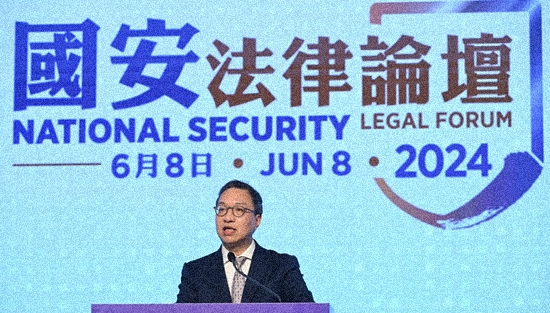
Hong Kong “justice” minister Paul Lam has assured members of the public that it is not as easy to act with seditious intent in post-2020 Hong Kong as they may fear. Not every sharply worded or mimed and indirect but clear enough chastisement of the state will get you thrown in jail.
Sedition versus not sedition
At a recent forum on “national security,” Lam (shown above) conceded that “the sedition offence, a colonial-era crime that has been incorporated into new domestic security legislation, had prompted worries among regular residents that ‘scolding [the government] harshly would be considered inciting hatred.’… Lam said that whether a remark was seditious depended on the context, and a message full of hate might not be viewed by others as inciting hatred.”
Also in attendance, and also delivering a presumably official message about the distinction between speech that is just critical and speech that is outright seditious, was Han Dayuan, a law professor at a university in Beijing. He stressed that the threshold for being convicted of seditious intent is “very, very high.”
“It is in line with the rule of law principles for residents to put forward criticism and suggestions—including sharp criticism—out of the expectation that the government should do better. We should distinguish these [from sedition],” said the professor.
So…everybody in Hong Kong: relax?
When Hong Kong artist Samnu Chen publicly air-wrote the numerals “8964” in order to archly allude to the date of the Tiananmen Square massacre, June 4, 1989, a gang of Hong Kong police swooped in and led him away as people recorded these actions on their cell phones. Soon afterward he was released, maybe after being sternly spoken to. He was not thrown in jail, merely harassed.
Did Samnu Chen count on this relatively mild treatment? Did he know that he faced no risk of being incarcerated? Did he know exactly how far to go to stay on the safe side of “seditious intent”?
Don’t forget
He couldn’t have known these things. Not when Hongkongers are being arrested for shouting “The people will not forget” or for displaying an image of a candle on their cell phones, actions that law professors in other lands regard as entirely “in line with the rule of law principles.”
All opposition media in Hong Kong has been shut down. All opposition citizen groups and activist groups in Hong Kong have been shut down. Representative government has been hollowed out. Many of the participants in these now-annihilated institutions devoted much time and energy to criticizing the government. From the government’s perspective, any criticism of the state and any opposition to it are “sedition,” “espionage,” “incitement,” “secession,” “collusion,” and/or “sabotage.” And it is finally in a position to fully enforce this perspective.
Whether Hong Kong government officials ignore an instance of wrongspeech or of incipient assembly or come down on it like a ton of bricks is a matter of chance and whim. Maybe a Hongkonger will guess correctly about what he can get away with on a given occasion. But he can’t take it for granted. For government officials or court intellectuals to say that it’s possible for a Hongkonger to criticize the government—even sharply—and not necessarily be punished for this is meaningless.





